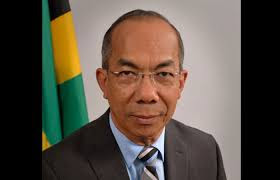News: Jamaica's Minister of National Security admits the government failed the poor in the inner-cities.
 |
| Minister of National Security, Dr. Horace Chang |
Minister of National Security, Dr. Horace Chang in January 2021, admitted that his government is partially to blame, as well as previous administrations over the years, for keeping inner-city residents immobilized in poverty.
His admission came after Managing Director of the Jamaica Social Investment (JSIF) Omar Sweeney and his social development manager, Mona Sue-Ho, made their presentations during the sitting of the Joint Select Committee on ‘Law Reform (Zones of Special Operations) (Special Security and Community Development Measures) Act, 2017’ in Gordon House.
The JSIF representatives were hit with a barrage of questions from lawmakers on both sides of the aisle. Member of Parliament for South St Catherine Fitz Jackson pressed Mr. Sweeney about the impact the JSIF has had through its various interventions in several inner-city communities.
"It seems to be just meandering along with no end in sight and lastly, what are those qualitative and quantitative measurements that we can look at and say yes, it is successful or we can do more," was Jackson’s parting shot.
In response, the JSIF head calmly informed the parliamentarians on some of the basic steps to achieving effective sustainable people empowerment.
He said:
"Vulnerable communities need support. There is a reason why Hunts Bay and Mountain View and the strip from Majesty Gardens to downtown require a different level of resources for policing than say Barbican; there is a reason. If we continue to look for a panacea or a magic bullet that’s just going to go into these communities and apply a set of targets or a set of interventions and walk away and all will be well, that’s not going to happen. It’s just not going to happen because there is a myriad of other issues that are abstract to what we are doing that lead to the problems that we have.
"What the government should look at is a long-term strategy so that you don’t have to wonder if ZOSO is meandering along or why is it three years? You need a long-term, a 10-year, a 20-year strategy that says okay, we are going to invest. If the budget is J$800 billion, we are going to invest J$3 billion a year in 20 communities or 30 communities for the next 20 years. That’s what has to happen."
With several programmes over the years, the JSIF has taken these experiences and gone on to successfully implement projects in 12 communities at a time, as well as other initiatives in 18 communities in seven parishes simultaneously.
"It can have this balloon effect where you apply this intervention here and then a set of problems start to happen over there," he said.
Social Services
Chang, who chairs the joint committee, afterwards admitted that the Government fully recognised that the "social services side" had not been functioning long before the Zones of Special Operations were introduced in 2017, and he sided with the Managing Director.
"The social services to the citizens in the troubled communities cannot be an intervention. It has to be a long-term impact because when you (JSIF) finish correcting the environmental problems, you need to move on. It is not a matter of meandering. The purpose of JSIF is to get in there, fix the basic environmental issues – road, light, water, etc.
"We need to ensure that the social services that these people are denied for years … that’s why they are deteriorating. The schools are bad, when you go down to South St Andrew none of the students you meet in the primary schools want to go Haile Selassie (High School) and that has been going on for 40 years. We build the school and leave it down there and all the bright students come to Jamaica College and Excelsior [Community] College and eventually they leave what’s left for the children down there and we treat them like what’s left, rather than provide a programme that will really raise them and get them out of that syndrome of poverty.
Dr. Chang also divulged about an incident in Denham Town:
"We found 56 cheques for disabled and lactating mothers and the agencies have the cheques to give them, but was sitting on the cheques until they were getting stale-dated. They were over four months old."
He lamented that the PATH payments, which is a small social safety net provided by the government and meant a lot to the poor, was going to waste and this was because persons in charge failed to distribute the cheques to the people who needed it the most, noting that the payment "is what is going to lift them out of their apathy and begin to give them some empowerment".







Comments
Post a Comment